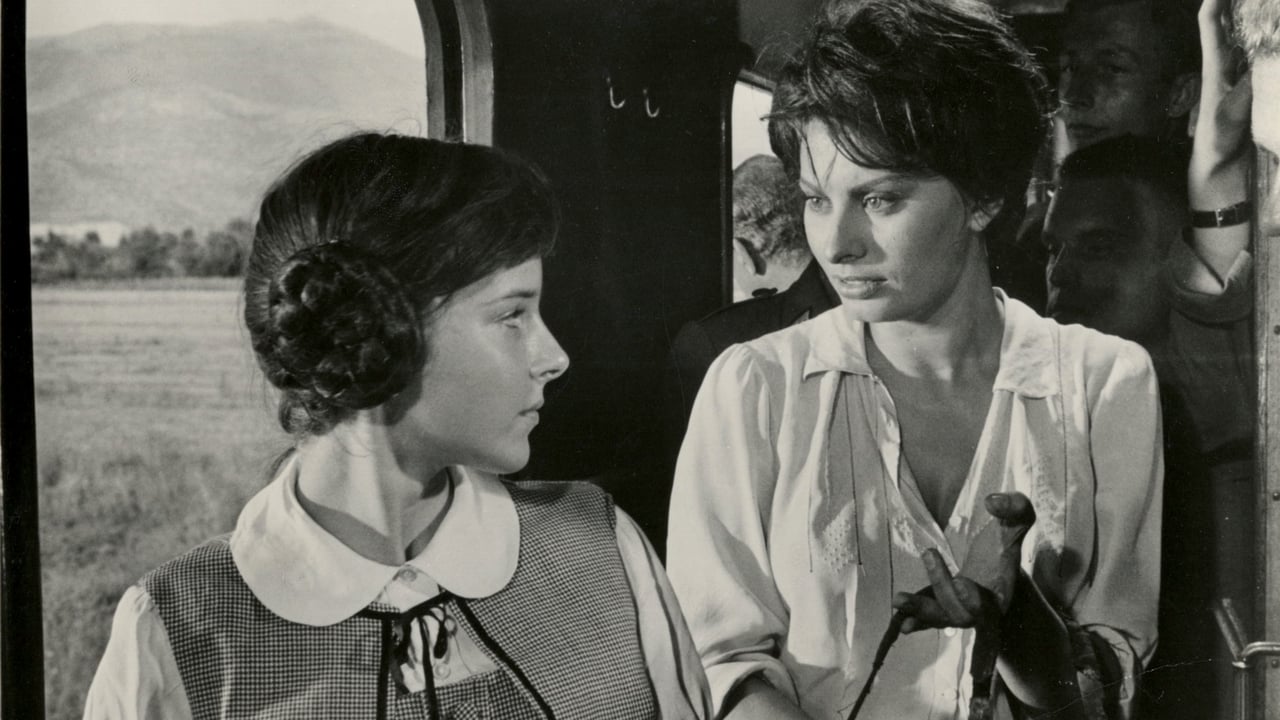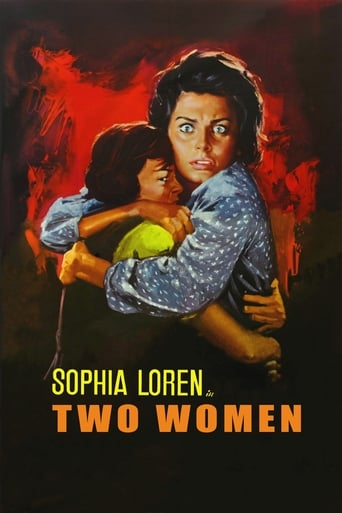

I just had the privilege of watching a double feature on "TCM on Demand" that consisted of two of my two favorite Sophia Loren films, "Two Women" (1960) and "A Special Day" (1977). Unlike many of her comedies and lighthearted films, these two movies highlighted her most serious, dramatic roles, and, in my view, her very best performances. Yes, she is certainly a magnificent looking woman, but these two accomplishments by themselves prove that she is also an outstanding professional who gives 100% of herself with superior results.While the production of "Two Women" preceded "A Special Day" by seventeen years, the first took place in 1944 during the closing days of World War II following the Allied victory at Monte Cassino in Italy while the second occurred in 1938 when Hitler visited Rome during the early stages of the same war. Both films were produced by Loren's husband, Carlo Ponti, and superbly illustrate the tragic, human cost of a prolonged and very brutal war, one at the beginning of the conflict and the other near its end. In "Two Women", Ms. Loren's marvelous effort earned her a well deserved Oscar as the first performance to win the award in a foreign language film. Her outstanding work was was augmented by the overall, excellent direction of Vittorio de Sica ("Bicycle Thieves", "Umberto D") and the moving musical score of Armando Trovajoli, who has accumulated a staggering 196 films, both American and Italian, to his credit. She also received very impressive support by Eleanora Brown, who appeared in her very first film at age twelve.Without revealing too much of the climactic scene in the abandoned, bombed out church, the director's skill at developing an ominous atmosphere, including the disturbed birds through the opening in the roof, allowed the viewer to expect trouble but not necessarily the calamity of the shocking episode that followed. Then, soon after the incident, we observe the forms of two dehumanized women as if they are inanimate rocks, drained of life itself, cast to the side of the road. After seeing the movie, I did some research on the actual circumstances of "Marocchinate", a term the Italians gave to the brutal, barbaric campaign of Moroccan troops under the command of the French in which they allegedly raped thousands of Italian women and murdered hundreds of civilian men who tried to protect them. Many of the attacks occurred in the region called Ciociaria, located to the southeast of Rome in central Italy, hence the actual title of the movie, "La Ciociara", or the women of Ciociaria. I was very surprised that these atrocities under the command of the Allies have not been officially and sufficiently documented. The silent reaction from the French to the events depicted in this film is even more shocking. It is not too late for the French government to address these very serious allegations more directly and more thoroughly.
... View MoreTWO WOMEN is a war drama about a mother and her daughter who are experiencing horrors during World War II. Film is based on the novel of the same name by Alberto Moravia.A wealthy widow and her twelve-year-old daughter flee from the occupied Rome to her native rural province in the south of Italy. After they arrive a beautiful widow attracts the attention of a young local intellectual with communist sympathies. Her daughter develops a strong bond with him. However, a young man is eventually taken prisoner by German soldiers, who hope to use him as a guide to the mountainous terrain. After the end of the occupation mother and daughter decide to return to Rome. However, war horrors have not stopped for two of them...This is a realistic and brutal story that describes a position of a beautiful woman (single mother) during the war. A very frivolous note is permeated through the story. Because of that, some of the scenes and the final climax are quite shocking. People are not evil, they are distraught, in apocalyptic war atmosphere. An escape does not have a clear goal in a maelstrom of violence. The pace and direction are extremely fast. The protagonists are exposed to hunger and poverty. The emptiness and anticipation are visible on their faces. This madness has to stop, but what to do after that. Dialogues are very "juicy" and they are a reflection of conditions in which people live.Sophia Loren as Cesira is a single mother and rich widow of an old merchant. She is a fiery and determined character who, after a tragic climax, is completely broken. She is woman, who has faced with life's destruction and a mother, who has survived the most terrible horror. Cesira is a passionate woman in every sense. The tears on her face speak about her war scars. Ms. Loren has offered an incredible performance.Eleonora Brown as Rosetta is an innocent, dignified and religious girl. The change in her character, after an aforementioned climax, is more than obvious. She is a girl, who matures in the most horrible way. Her connection with a funny and shy Michele (Jean-Paul Belmondo) is a kind of a necessity for a fraternal or paternal figure. Michele is a young man who is passionately in love with her mother. However, his love is not reciprocated. His character is a kind of voice of reason and decency, which is rare in war conditions.This is a compelling story of war, in which the final catharsis is mixed with a life pathos.
... View MoreWhen she goes to visit Carlo in his shop. To cut to the chase it is an exciting scene. By his words you can tell he is baiting her to sleep with him. He mentions her awful old husband and asks her when was the last time she had it. She gets very mad at him for making advances but eventually gives in. It is a perfect example of how a woman plays innocent but in reality she wants it so badly from him as she does give in. The only change I would make in this movie would be somewhere in the story line she gets pregnant from Carlo. Since he admitted he would kill his own wife and marry her. That was a very powerful scene without any nudity. Only one can imagine how the climax went between the two of them.
... View MoreWhen doing academic film studies there's certain cinematic movements that are essential study such as German Expressionism , Soviet montage and French New Wave cinema . Unfortunately Italian Neo- Realist features , . I say unfortunately because it's something I've always found as being uninvolving cinema . I do remember seeing Rome Open City at an art house cinema and failed to remember a thing about it by the time I got home which probably says a lot of its quality . I do recall Germany Year Zero but that's mainly down to its downbeat ending . In short Italian Neo-Realism is the artistic equivalent of watching paint dry . There might be nothing particularly bad about it but by the same yardstick there's nothing all that good either The director of TWO WOMEN is Vittorio De Sica who also wrote and directed the 1948 Italian neo-realist classic THE BICYCLE THIEVES a film that I haven't seen and have no intention of unless it appears on television , though it's considered a " classic " which is film studies speak for pretentious people pontificating about philosophical matters which have got very little to do with what's on screen .. It's interesting in so far that every plot synopsis says the film is about Cesira and her 13 year old daughter Rosetta being gang raped by Moroccan Goumier troops but this is infactual because the rapes happen about ten minutes from the end of the film I wouldn't say this is a bad film as such but it's a frustrating one and what makes it so frustrating is the way the two lead characters walk from one underdeveloped situation to another . They flee Rome to escape the allied bombing . More could have been made of the fact that more Italian civilians were killed by allied bombs than British civilians were killed by Lufftwaffe bombs during the war . They meet up up a communist sympathiser , played by Jean Paul Belmondo , who reads from the bible ! . Yes I also doubt that the bible was essential reading for communists anywhere , though this probably takes up the biggest chunk of the running time and no one seems to point out the contradictions between Marxism and Christanity . Then finally there comes the gang rapes and the aftermath but before we really get any true aftermath the end titles come up . Certainly much more could have been made about the conduct of French colonial troops during the Italian campaign So just to reiterate if you're unfamiliar with the concept of Italian Neo-Realism cinema and have heard great things about TWO WOMEN then you may very well be disappointed . Of course one of the obvious aspects of any type is realist cinema is the way story strands either disappear or come to a dead end . But this is not to excuse TWO WOMEN from being an extremely frustrating viewing experience
... View More